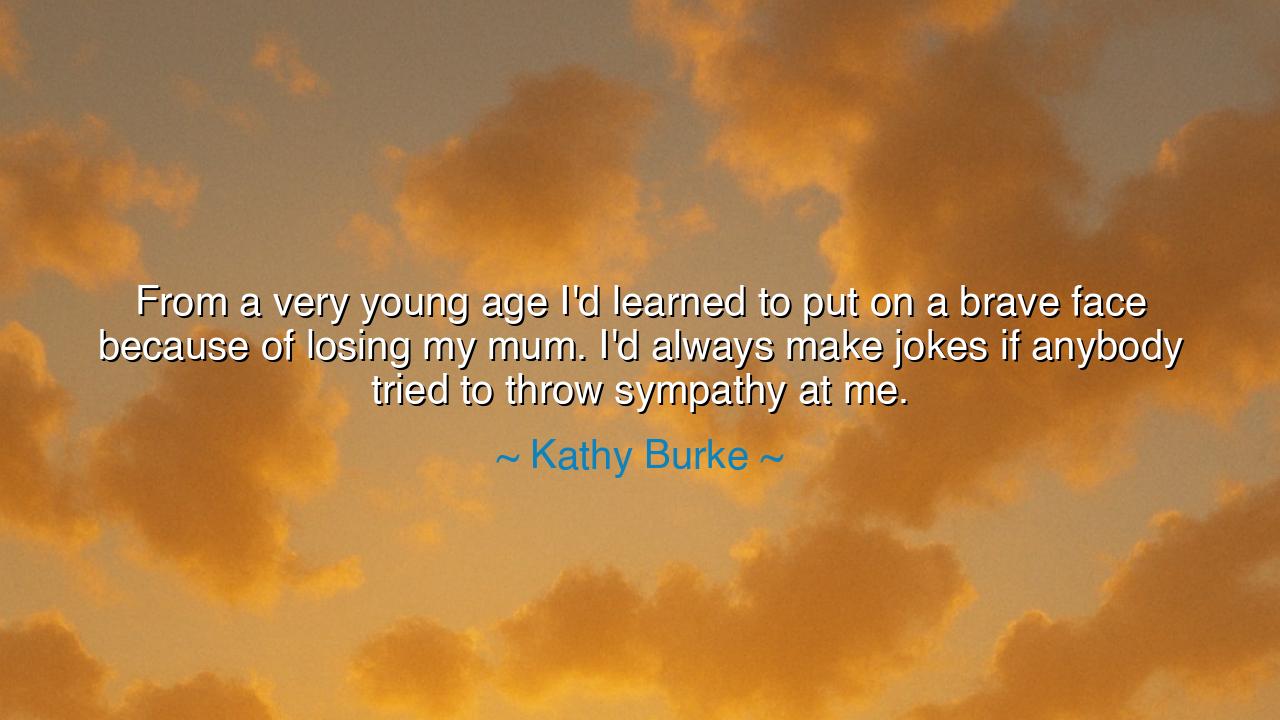
From a very young age I'd learned to put on a brave face because
From a very young age I'd learned to put on a brave face because of losing my mum. I'd always make jokes if anybody tried to throw sympathy at me.






Hear the words of Kathy Burke, spoken from the well of her own sorrow: “From a very young age I’d learned to put on a brave face because of losing my mum. I’d always make jokes if anybody tried to throw sympathy at me.” In this confession there lies the story of grief, of strength, and of the armor a child fashions when the world deals them a heavy blow before their time. It is the voice of one who has walked through loss and chosen laughter as her shield. Though it may appear as jest to others, behind it beats a heart forged in resilience.
The meaning is thus: when faced with grief too large for the tender heart of youth, she learned to protect herself not with tears but with courage, not with cries but with humor. To put on a brave face is no small thing; it is to master one’s own emotions so as not to be swallowed by them. To turn sorrow into jokes is to wrestle pain into something that cannot consume, to seize control of what otherwise would overwhelm. In her words we hear the wisdom of those who learn early that life is both cruel and precious, and that survival sometimes requires a mask.
The ancients too knew this struggle. Consider the tale of Odysseus, who, after long years of war and wandering, concealed his grief in wit and cunning. When taunted by enemies, he did not weep openly, but answered with cleverness, turning mockery into strength. Like Burke, he understood that laughter can disarm sorrow and shield the spirit. Yet beneath the surface, both hero and child carried wounds unhealed, scars that remained hidden from the world’s gaze.
There is also a truth known in the life of Abraham Lincoln, who, though burdened with melancholy, often cloaked his sorrow in humor. In the darkest days of the American Civil War, he told stories and jokes, not to belittle the suffering around him, but to keep despair from crushing his soul. Those who heard him laugh often did not see the shadows that weighed on his heart. Just as Burke described, he used humor as a vessel of endurance, transforming sympathy into something he could bear.
But let us not mistake this armor for the absence of pain. To reject sympathy is often to fear being broken by it, to fear that opening the floodgates of grief will drown the soul. Burke’s words remind us that not all who smile are untroubled, and not all who jest are untouched by sorrow. Some smiles are shields, and some jokes are cries in disguise. Thus, we are called to deeper compassion: to see beyond the brave face, and to honor the struggle it conceals.
The lesson for us is clear: do not scorn the armor of others, but learn to recognize it. If a friend laughs when you offer comfort, do not assume they are unscarred. Instead, respect the path they choose to walk, and remain steady beside them, patient and faithful. In your own life, know that strength can take many forms: sometimes in open tears, sometimes in silent endurance, sometimes in laughter that masks grief. All are valid, and all deserve respect.
Therefore, take this wisdom into your living: when hardship strikes you, do not fear the tools you must use to survive, whether they be humor, courage, or solitude. But also, in time, seek the healing beneath the mask, for no armor should be worn forever. And when you see another clothed in jest, remember Burke’s words, and let your sympathy be patient, your love steady, your presence true. For behind every brave face may lie a story of loss, and behind every joke a heart that longs simply to endure.






AAdministratorAdministrator
Welcome, honored guests. Please leave a comment, we will respond soon